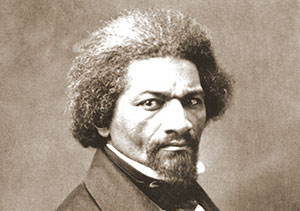
American social reformer, abolitionist, orator, writer, and statesman Frederick Douglass.
By Rachel Berets
On July 5, 1852 Frederick Douglass asked “What to the Slave is the Fourth of July?” in his now-famous speech of the same name. He proceeded to reply to his own question, stating, “I answer: a day that reveals to him, more than all other days in the year, the gross injustice and cruelty to which he is the constant victim. To him, your celebration is a sham; your boasted liberty, an unholy license … a thin veil to cover up crimes which would disgrace a nation of savages.”
This year, on Thursday July 2, The Somerville Museum in conjunction with the Somerville Media Center, hosted “Reading Frederick Douglass Together,” a virtual reading and discussion of Douglass’s speech led by Keidrick Roy, a PhD candidate in American Studies at Harvard University and a U.S. Air Force veteran.
The virtual event began with a recorded reading of Douglass’s speech featuring over forty community members who recorded themselves reading a paragraph or more. The recordings were eventually compiled into a moving 40-minute video by the Somerville Media Center and the Somerville Museum.
The speech advocates for the abolition of slavery and calls out the hypocrisy of a nation that prides itself on liberty and freedom but allows enslavement and oppression to persist. “Americans! Your republican politics, not less than your republican religion, are flagrantly inconsistent. You boast of your love of liberty, your superior civilization, and your pure Christianity, while the whole political power of the nation is solemnly pledged to support and perpetuate the enslavement of three millions of your countrymen,” said Douglass.
During the discussion after the reading of the speech, Roy asked the listeners several questions including, “In the wake of recent events, what does the Fourth of July mean to you?” and “In what ways does Douglass’s Fourth of July Speech point to his own belief that Black Lives Matter?” Throughout the thoughtful discussion, Roy reminded viewers to think critically about what unique tools they possess to create change within their communities and what they can do to educate themselves.
Roy also elaborated on the danger of staying still and maintaining the status quo, stating “Stasis is the enemy” and ending the discussion questions with this story: “Late in life, when a young man asked Frederick Douglass what to do in order to become a great leader, Frederick Douglass looked to the young man and said three words: agitate, agitate, agitate.”















Reader Comments